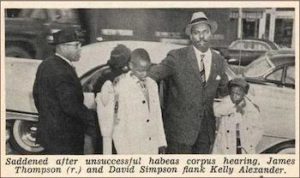
9-year-old James Thompson, and 7-year-old David Simpson
*The Kissing Case occurred on this date in 1958. This was the arrest, conviction, and lengthy sentencing of two preteen Black boys in Monroe, North Carolina.
In late October 1958, Sissy Marcus, a 7- or 8-year-old white girl, told her mother she had kissed 9-year-old James "Hanover" Thompson and 7-year-old David "Fuzzy" Simpson on their cheeks. She had seen them while with other children and recognized James as a friend from earlier childhood. The two had played together when James accompanied his mother to her work as a domestic for the Marcus family. The boys were Black.
When Sissy told her mother, Bernice Marcus, about the encounter, the woman became enraged and washed her daughter's mouth with lye. She called the police and accused the boys of raping her daughter. Local officials detained the two young boys, who were arrested and refused to allow them to see their parents or legal counsel for a week. Police beat the boys and threatened them with more injury to extract confessions. After being jailed for three months, the boys were charged by Juvenile Judge Hampton Price and convicted of molestation. Price sentenced them to reform school until the age of 21.
During this time, no judge from North Carolina would overrule Price. The local Ku Klux Klan burned crosses in front of the boys' families' houses, and some people shot at the houses. The Monroe KKK chapter was strong, and an estimated 7,000 Klan members attended a Klan meeting near Monroe, a city with a population of only 12,000. In December 1958, the Committee to Combat Racial Injustice (CCRI) was formed in New York City. On behalf of the two boys, they conducted "fund-raising, helping to secure legal counsel, and soliciting public and private moral support."
Leaders and members of the local NAACP, Eleanor Roosevelt, President Eisenhower, and other civil rights organizations protested the charges, trial, and sentencing. These efforts contributed to the pressure for the boys to be freed and their pardons early in 1959. The United States was embarrassed by protests from other governments, demonstrations in major cities, and strong criticism in the international press. North Carolina Governor Luther H. Hodges finally granted amnesty to the boys, releasing them from the reformatory in early 1959 after they had been there for three months. Neither he nor the authorities in Monroe officially apologized to the boys or their families.